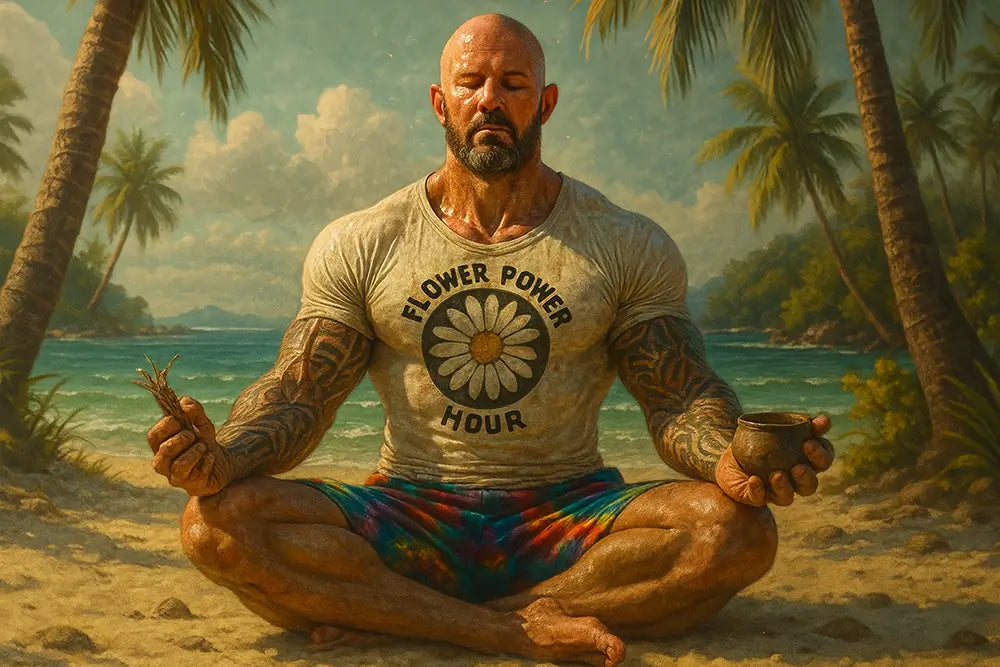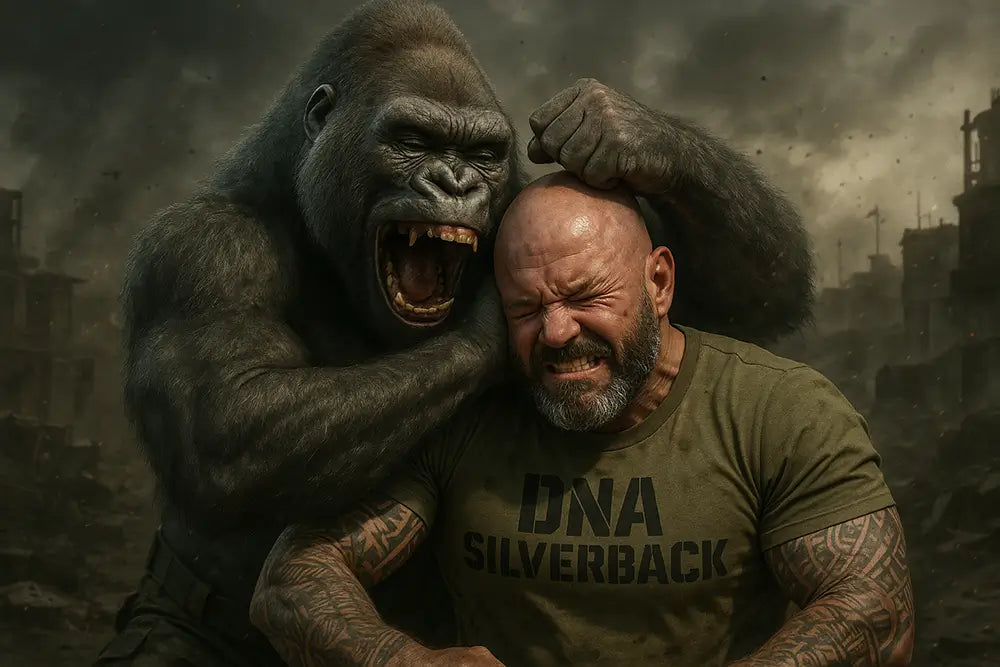What is andropause?
Andropause is having its moment! And in our opinion not a day too soon.
For those new to this topic, Andropause is a term used to describe the decline in testosterone levels in men as they age.
Just to add to the confusion - its also referred medically as late onset hypogonadism.
Most people know the more commonly term for Andropause - "male menopause" and sometimes its nickname "Manopause".
It's associated with a range of symptoms including fatigue, decreased libido, mood swings, and decreased muscle mass. This is driven by the loss of the most dominant male hormone testosterone which is vital for health and disease prevention. It's often misdiagnosed as depression - or not diagnosed at all with the NHS stating that most men experience symptoms for two years before seeking support.
We're here to help you navigate this subject as we know there's a lot of confusion and misinformation around it.
We'll be breaking down everything you need to know about andropause - from its definition and symptoms to debunking myths surrounding "male menopause." So sit back, relax, and let us guide you through this journey.
Male menopause. Fact or Fiction?

It certainly is fact and far from fiction. Just ask Robbie Williams who has bravely come out and talked about how debilitating and confusing he found andropause to be.
Detailing how many negative impacts it had on his mental and physical health and impacted his personal relationships.
He is far from alone. Andropause is one of the most undiagnosed and up-talked health issues facing modern men. We strive to shine a light on this subject and draw attention to help support men through this time of life.
Isn't low testosterone just an old man issue?
No sadly its not. A few generations ago, low-T used to be an ageing male issue. But now its an increasingly young man issue and is impacting all men as they age.
To give some perspective, a 30 year old man today has the same testosterone levels his grandad did in 1990. T-levels have halved in 50 years and this is speeding up which dire consequences on health, fertility and longevity.
Now low T is a modern man issue that's been called the silent epidemic as its believed to be one of the most under-diagnosed conditions in the world.
Thankfully media attention is finally acknowledging this very real issue that men are experiencing and now at younger ages than ever. Men's hormone levels are being impacted by many environmental factors such as plastics and pesticides alongside many other toxins. This is having catastrophic impacts on men's hormone levels. It has also been impacting testosterone and fertility levels negatively for the past 50 years. Leading to the lowest levels on record. This is having serious consequence for men's health, happiness and longevity.
Is male menopause the same as menopause?

They both involve age related hormonal decline and actually do share similar symptoms.
However, menopause isn't being affected by lifestyles and environmental issues in the same way T-levels are. The fact is that men experience hormonal decline in the same way women do and it can impact them in similar ways but it is happening at younger ages and for longer.
Sadly it still has a lot of stigma associated with it which prevents millions of men from seeking the help they need and deserve.
As the market starts to level up and acknowledge the poor state of male hormonal health, It's time to demystify this condition that affects modern men and is more common than ever. Andropause is a natural part of the aging process in men. It is where levels of testosterone decrease and its essential that men understand how and why this happening. Never more so, as its now happening in many more younger men than twenty years ago. It's now far from being an issue that just affects men in midlife. Men’s hormone levels and balance often go through changes as they age, particularly if they fall into ill health due to problems like obesity, stress, and high alcohol intake.
Understanding Andropause in males and low testosterone levels
Did you know that men's testosterone levels peak at age 19? Or that testosterone is produced overnight every single night? These two facts alone are vital to know. Many men think that they are too young to experience what they perceive to be an old man's issue. However, that's not the case now. Its also important to understand the link between low testosterone and andropause.
Andropause refers specifically to age related testosterone decline. This should occur naturally in mid life. However low testosterone isn't always linked to age now. It's occurring earlier than ever because of poor lifestyle factors. These factors are preventing the body from being able to make its own testosterone effectively.
Symptoms of Men's Andropause
Hormone changes in men, bring similar symptoms and feelings as menopause and they can be experienced from your late twenties. Successfully managing andropause symptoms, including loss of libido and memory loss, involves the right lifestyle factors. Understanding what is causing or driving this loss of natural production of testosterone and that does vary with age. Morning erections and declining sex drive, or low libido, are both linked to low testosterone. They are common symptoms and often what men notice first. Fatigue can be a sign of low testosterone as can weight gain. Some less well known symptoms include hot flushes and night sweats which most men may more commonly relate to female menopause but can happen to them too.
Understanding these symptoms and why they are happening is vital for promoting men’s health and well-being as they can negatively impact personal lives.
When will I notice male menopause andropause symptoms?
Good question and there is no one size fits all answer. It all honestly depends on your health and your lifestyle factors - as well of course as your age.
Andropause - also known as androgen deficiency - is typically used to describe age related testosterone decline. This is when your body ability to produce testosterone naturally decreases. When testosterone levels are low in younger men (under 40), this is usually a sign of some poor lifestyle factors that needs addressing.
Low-T can occur as early as the twenties due to various factors. Obesity, stress, poor sleep and nutrient deficiencies meaning that this is now an issue for 1 in 5 men under 30. By 40, testosterone levels are declining 1-2% per year. 45% of men over 40 are experiencing symptoms of low levels of testosterone, including decreased free testosterone levels. It's important to know what they are as you don't have to accept them as simply a necessary part of ageing. This hormonal shift brings about physical, sexual and emotional changes. These can impact men's health and quality of life, potentially leading to health problems with serious issues including Alzheimer's, Osteoporosis and Heart Disease linked to low levels.
Why do I have low testosterone levels?
Understanding why you have may have low levels of testosterone, including the potential presence of prostate cancer, is key to managing its symptoms effectively. Particularly as in only 5% of men with low levels of testosterone there is an underlying medical condition driving this. For most men its lifestyle related, ageing or both which is why you should look at addressing these naturally as Testosterone Replacement Therapy does not address root causes. It simply replaces your own testosterone supply with synthetic ones - turning off your own supply which in term turns off sperm production as a side effect.
Recognising the signs of andropause is a crucial step in promoting men's overall well-being as low T is linked to many chronic diseases and early death - including being a 6 x risk factor of death from Covid showing how vital it is to have healthy levels. Its increasingly common for andropause symptoms to impact men's daily lives. Timely recognition and understanding the symptoms of symptoms empowers men to prioritise their health and lifestyle. By recognising and addressing these symptoms early and proactively, men can take charge of their health and seek appropriate interventions, promoting a healthier and happier life.
What is one major difference between menopause and andropause in men?
One major difference between menopause and andropause is that menopause is the cessation of menstrual periods in women which is easy to quantify. Whilst andropause refers to a gradual decline in testosterone levels in healthy men and can also lead to elevated oestrogen levels in men but we'll leave that topic for another time!
Menopause typically occurs around age 50, while andropause usually refers to mid life in men but low testosterone symptoms are appearing in millions of men from their mid to late twenties. Menopause symptoms include hot flashes and mood swings, while andropause symptoms can include erectile dysfunction and decreased libido. Both experience shared symptoms of cognitive decline, memory loss, weight loss, sleep disturbances, loss of confidence, bone loss, and many more symptoms. It's helpful that andropause is talked about and addressed as menopause is in women, highlighting the major difference between menopause and andropause in terms of the age range, specifically middle age.
Conclusion
To sum it up, andropause is a natural process that occurs in men as they age but low testosterone can and is happening in many younger males. While it may not receive as much attention as menopause in women, it is important to understand the symptoms and effects it can have on daily life. Testosterone deficiency plays a significant role in andropause and does need to be addressed for optimal health and longevity.
Ref
https://www.nhs.uk/conditions/male-menopause/
https://www.mayoclinic.org/healthy-lifestyle/mens-health/in-depth/male-menopause/art-20048056
https://www.healthline.com/health/menopause/male
https://www.baus.org.uk/patients/conditions/7/male_menopause_androgen_deficiency_in_the_ageing_male/
https://www.webmd.com/men/male-menopause
https://www.wpa.org.uk/health-wellbeing/articles/andropause






Share:
New Year, New Habits, New You!